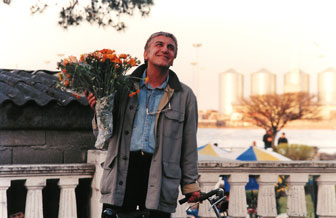Groundless suspicion
by Ari Siletz
18-Jun-2008
The reasons for the deceptions are different. Touka is misinformed by her fiancee’s best friend because he wants her for himself. Atieh on the other hand took the word of Aziz's father who lied to save face. Likely Atieh's own father encouraged this lie “for her own good.” He wouldn’t want her wasting her youth waiting for Aziz. How they got away with this lie in a tiny town where Aziz has close friends, we are not to question. The characters, however, are free to indulge in outrageous skepticism. Touka’s jailed fiancée for instance, thinks Aziz has hired him a lawyer just to botch the criminal case against him. He suspects the middle-aged Aziz has fallen in love with young Touka and wants to eliminate rivals. Aziz in turn frustrates us with his stoic silence against this accusation.
The most frustrating moment of Aziz’s stoicism, however, happens when Aziz and Atieh (Roya Nonahali [3]) meet. He says nothing to clarify why he disappeared from her life. In fact he says nothing at all, because Atieh yells at him to shut up and listen while she guilt trips him about showing up after all these years to ruin her restaurant business. After her husband’s death, she has moved into the property abandoned by Aziz’s family, and set up a restaurant there. Now, she thinks, Aziz is there to reclaim the property and evict her. The presence of a lawyer in the picture convinces her of this.
Atieh’s suspicion is unfounded. Aziz had no idea anyone was squatting in his property, or even seemed to care, but he is in no hurry to make this clear, or to explain about the lawyer. Nor does he ask Atieh what went on with her during all these years. Instead he asks a friend who tells him Atieh’s husband beat her senseless one night then took a rowboat out to sea never to return.
The domestic quarrel and the suicide are not explained, but this revelation along with subtle line deliveries by Reza Kianian invites us to guess at more reasonable directions the plot may have taken if censors hadn’t been watching: Aziz and Atieh had premarital sex. Touka may be Aziz’s daughter. This is why Atieh’s husband went nuts, and this is why Aziz and Touka hold each other in such deep affection.
Now that the characters’ behaviors have found a sensible basis, we see that Atieh's father had no choice but to quickly find a husbad for his pregnant daughter. Atieh’s moving into Aziz’s house with her child, and the issue over property rights suddenly picks up considerably more logical as well as social and dramatic substance.
Reza Kianian’s artistry helps cut through some of the fog. In the scene where he and Touka first meet, he is multifaceted with his line delivery. “Are you Touka?” he says, and we can't be sure if he's responding to Touka's flirting or enjoying getting to know her after all these years. At a later dinner table scene, his line delivery of “Now that we are all together,” has a strong flavor of paternity. The sense of this alternate plot is strongest when Aziz confides in a friend, “Atieh acts as though we never…”
But director Ali Rafii (Fined [4] by IRI in 2002 for "promoting immoral conduct" in a play ) knows such a film would never see the light of the projector. Instead censorship has left him with a confusing movie vulnerable to banal panderings to the male-bashing market. This has resulted in inaccurate plot descriptions [5] such as:
“Atieh’s singular passion is food, and her small but popular restaurant on the sleepy Caspian coast is her pride and joy. But when Aziz, a former lover, appears after a twenty-year absence with the intention of closing the restaurant, Atieh prepares his favorite dishes, one after the other, in a desperate effort to convince him otherwise. Loosely based on the Persian fable of Shahrazad and the Thousand Myths (A Thousand and One Nights), director Ali Raffi uses the language of food to paint a richly textured portrait of life and love on the Southern coast of Iran [sic].”
Never mind that the above description has a Google sense of geography; it also gives no clue that the Shahrzad theme and the pretty food are just marketing candy. Yet, despite the silent compromises Rafii seems to have made to censorship and international marketing, his message about the destructiveness of groundless suspicion comes through, and makes a powerful emotional impact.
Reza Kianian’s interpretative skill as an actor encourages us to be patient with the film’s frustratingly stoic compromises, and view it for the moment as a visually delightful post-modern work. One day, after a thousand and one such tales, the censors may relent.
| Recently by Ari Siletz | Comments | Date |
|---|---|---|
چرا مصدق آسوده نمی خوابد. | 8 | Aug 17, 2012 |
| This blog makes me a plagarist | 2 | Aug 16, 2012 |
| Double standards outside the boxing ring | 6 | Aug 12, 2012 |


